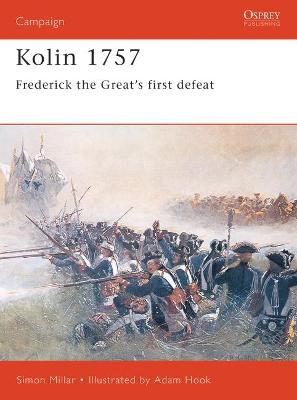Osprey Campaign S.
4 primary works
Book 91
In May 1757 Frederick the Great invaded Bohemia, smashed an Austrian army outside Prague and bottled it up inside the besieged city. The Empress Maria Theresa could not sit by and allow the second city of the Empire to be captured and Marshal Daun was despatched with 60,000 fresh troops to its relief. This volume details the actions that ensued when, characteristically aggressive, Frederick gathered all available men and marched to meet Daun whose infantry alone almost outnumbered Frederick. Undaunted, Frederick decided to try to turn the Austrian right flank. Marshal Daun saw through Frederick's manoeuvre and when the Prussian infantry attacked on 18th of June the Austrians were waiting.
Book 113
By July 1757, in the aftermath of defeat at Kolin, the situation looked bleak for Frederick the Great of Prussia. French troops had invaded allied territory, whilst other French and Austrian armies were moving towards Hanover. Marching west, Frederick's men faced French and Austrian troops at Rossbach on 5 November. In less than two hours it was over. The Allies had lost 10150 men and the rest fled. This title examines how on 6 December, Frederick won what was perhaps his greatest victory at Leuthen. More than 12000 Austrians were captured, and 6750 killed. Five days later, Breslau surrendered. Napoleon referred to this campaign as a "masterpiece of manoeuvre and resolution".
Book 125
In January 1758, despite his victory over the Austrians, Frederick the Great found himself threatened once again. Despite their impressive stand at Gross-Jagersdorf in July 1757, Frederick did not take the Russian threat seriously. Fermor's Russians were laying siege to the fortress of Kustrin. Frederick reached the Oder and marched north, placing his army across Fermor's line of communication and supply. Fermor abandoned the siege and marched to Zorndorf. On 25 August, Frederick attacked. The Russian infantry turned to meet this threat and refused to buckle until General Seydlitz threw his cavalry against the Russian right flank. The Russians broke and fled. Frederick had managed to temporarily stave off the Russian threat but his illusions about Russian competence were shattered.
Book 128
Before the war of Independence properly began, the American Continental Congress invited the Canadians to join their struggle against the British but the Canadians showed little enthusiasm. This book details the battle between Montgomery and Arnold's untried troops and Carieton's awaiting British forces in Quebec. This catastrophic American defeat was to set a precedent for the following battles at Trios Rivieres and the Cedars. On 11 October 1776 Carleton's fleet reached Valcour Island, where Arnold's force was anchored. Despite some damage to the leading vessels, the British overpowered their enemy and only nightfall prevented total annihilation. An eventual retreat by Carleton brought on by the early onslaught of winter was to have momentous consequences in 1777.


